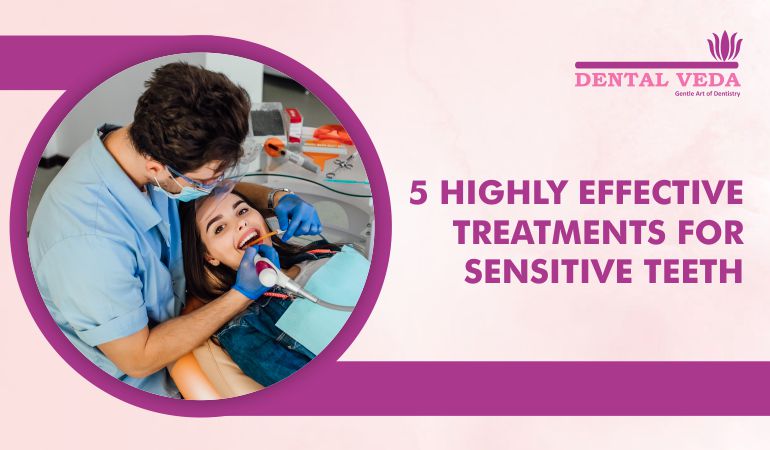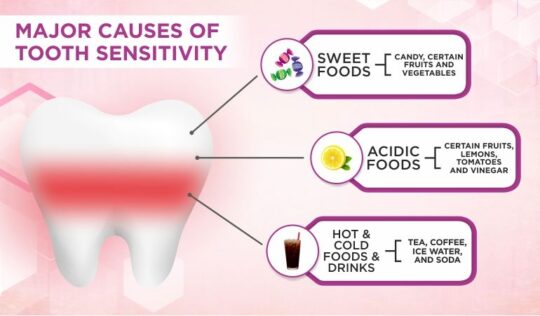Do your teeth hurt while sipping hot tea or iced coffee, or do your teeth tingle while brushing or flossing?
If yes, then there are high chances that you may be facing the issue of tooth sensitivity. Fortunately, you don’t have to live with this issue for the rest of your life as there are various effective treatments for sensitive teeth.
Sensitivity in your teeth can be triggered by hot, cold, sweet, sour foods and drinks. It is a common dental issue among youngsters and adults.
A report by NDTV showed that in today’s scenario, 1 out of 3 people suffers from tooth sensitivity. However, only 1 in 5 people addresses this problem.
But what are the causes of tooth sensitivity? Sensitive teeth are mainly the result of worn tooth enamel or exposed tooth roots. Sometimes, tooth discomfort can be caused due to factors including; a cavity, a cracked or chipped tooth, a worn filling, or gum disease.
Pain of tooth sensitivity can be sharp, sudden, and shoot deep into tooth nerve endings. In addition, you can also feel pain in your teeth while brushing, eating, and drinking. This pain could indicate teeth sensitivity. Therefore, it is essential for you to address this issue as soon as possible.
If you’re bothered by sensitive teeth, you should visit your dentist. He can identify any underlying causes of your tooth pain. Then, depending on the condition, the treatment options can be recommended.
Read on to know about the most effective treatment options for your tooth sensitivity:
Initially, when you visit your dentist, the following treatment options can be recommended for you:
Desensitizing toothpaste
One of the foremost treatment options available for tooth sensitivity is desensitizing toothpaste. The effectiveness of desensitizing toothpaste lies in its ingredients.
Desensitizing toothpaste contains some active agents like potassium, fluoride, and nitrates. These active ingredients alleviate tooth sensitivity by calming the nerves of your teeth.
Moreover, these ingredients block the pain signals that travel between the surface of the tooth and the sensory nerve inside.
As recommended by your dentist, you should use these toothpastes twice a day to get relief from the symptoms of tooth sensitivity.
Applying fluoride
To strengthen your tooth enamel or reduce pain, dentists can apply fluoride to the sensitive areas of your teeth. Fluorides are applied directly to your teeth to remineralize the tooth enamel or to make it stronger.
Fluoride varnish or gel are applied to your teeth as it works as enamel protection. This can help maintain healthy teeth and may reduce tooth sensitivity.
Moreover, a dentist can also recommend eating food containing fluoride content and drinking water supplies, which are often fluoride infused.
However, if your condition is severe and if these treatment options won’t work, your dentist can suggest other effective treatment for tooth sensitivity. These treatments may include:
Surgical gum graft
Tooth sensitivity can also occur due to gum recession. When you have receding gums, the soft dentine [ tiny holes leading directly to the nerve at the center of the tooth] inside your gums can become exposed. It can cause severe tooth sensitivity.
People who develop tooth sensitivity after their gums recede can get relief from gum surgery known as a gum graft.
Gum grafts are helpful to cover roots or develop gum tissues. During a gum graft surgery, your periodontist takes gum tissues from your palate to cover the exposed root. Surgery can be used to reduce sensitivity on one tooth or several teeth.
Root canal treatment
If other treatment options are not giving relief to your sensitive teeth and you are regularly experiencing discomfort, your dentist may suggest getting a root canal.
Root Canal treatment involves removing the sensitive nerves from your tooth. While this treatment may seem complicated,it could be a better treatment to remove sensitivity.
A root canal treatment is recommended by the dentist when the pulp or soft nerve tissues inside the tooth cause infections and inflammation, pain, and discomfort to the teeth and gums.
Dental crown bonding
Chipped or broken teeth can cause sensitivity in your teeth.
A dental bonding treatment is an effective treatment for sensitive teeth since it does not need the removal of enamel. Instead, a dentist merely needs to roughen and moisturize the tooth before starting the restoration.
Next, a tooth-colored bonding material is applied to the tooth and shaped into place. Thus, it helps in restoring a cracked or damaged tooth, which can ultimately give you relief from sensitivity.
Dental Veda: Best Dentist in Gurgaon
Dental Veda offers top-quality dental care to all patients. Our dentists in Gurgaon have extensive experience in treating all types of dental problems.
Book an appointment with our dentists today!
Frequently Asked Questions
Does salt water rinse help sensitive teeth?
Yes, a saltwater rinse is an easy and effective way to give comfort to the pain caused by sensitivity. Salt is considered an effective antiseptic to reduce inflammation and discomfort caused by sensitivity.
Which vitamin deficiency can cause teeth sensitivity?
Vitamin B deficiency can cause teeth sensitivity. It can cause toothaches, receding gums, and overall sensitivity of the mucus membrane in your mouth.
How can a dentist desensitize your teeth?
Your dentist can recommend various treatment options to desensitize your teeth. These treatment options can be based on the severity of your condition. In addition to reducing your teeth's sensitivity, they can also prevent pain signals from reaching your nerves.



